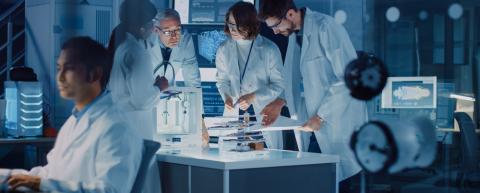
Recommendations on how to ensure the safety and effectiveness of biosimilars in Latin America: a point of view
Recommendations on how to ensure the safety and effectiveness of biosimilars in Latin America: a point of view
Recommendations on how to ensure the safety and effectiveness of biosimilars in Latin America: a point of view
Carlos Pineda & Carlo V. Caballero-Uribe & Marcia Gonclaves de Oliveira & Pedro Saul Lipszyc & Jose Julian Lopez & Marcelo Mario Mataos Moreira & Valderilio Feijo Azevedo
Clin Rheumatol (2015) 34:635–640 DOI 10.1007/s10067-015-2887-0
Abstract
The use of biotechnology-derived medicines has significantly increased in recent decades. Although biosimilars undergo rigorous characterization as well as clinical studies to document their safety and effectiveness, they are highly complex molecules and small changes in the purification and production process of a biosimilar can have major implications in its safety and effectiveness profile. In Latin America, regulatory authorities have begun to establish well-described and standardized pathways that permit a biosimilar to gain commercial licensure. In order to be certain that a biosimilar reaches its potential in ordinary clinical use, an intensive post-licensing monitoring system must be established since it is the only means to ascertain the true similarity between the original biologic and its biosimilar. Pharmacovigilance allows national authorities to determine a drug’s performance in the marketplace. An effective tracking and pharmacovigilance system for biological medicines has many steps and processes. To aid policy makers in Latin American in addressing the many issues surrounding the establishment of an effective pharmacovigilance system, the Americas Health Foundation convened a group of experts to discuss the topic and develop recommendations for implementation. The group discussed current challenges and gaps in pharmacovigilance in Latin America, paying close attention to the major issues associated with traceability and pharmacovigilance of biosimilars following their approval. The recommendations developed should enable countries to accurately document the safety and performance of a biosimilar as experienced by patients under real-life conditions and have a significant impact on the successful implementation of pharmacovigilance of biosimilars throughout the region.
The global challenges and opportunities in the practice of rheumatology: White paper by the World Forum on Rheumatic and Musculoskeletal Diseases
Mustafa Al Maini1, 14 , Femi Adelowo2, Jamal Al Saleh3, Yousef Al Weshahi4, Gerd-Rüdiger Burmester5,Maurizio Cutolo6, Joseph Flood7, Lyn March8, Heather McDonald-Blumer9, Kevin Pile10, Carlos Pineda11,Carter Thorne12 and Tore K. Kvien13
Clinical Rheumatology Journal of the International League of Associations for Rheumatology 201434:2841
DOI: 10.1007/s10067-014-2841-6
Abstract
Rheumatic and musculoskeletal diseases (RMDs) represent a multitude of degenerative, inflammatory and auto-immune conditions affecting millions of people worldwide. Persons with these diseases may potentially experience severe chronic pain, joint damage, increasing disability and even death. With an increasingly ageing population, the prevalence and burden of RMDs are predicted to increase, placing greater demands on the global practice of rheumatology and related healthcare budgets. Effective treatment of RMDs currently faces a number of challenges in both the developed and developing world, and individual countries may face more specific local challenges. However, limited understanding of the burden of RMDs amongst public health professionals and policy-makers means that these diseases are often not considered a public health priority. The objective of this review is to increase awareness of the RMDs and to identify opportunities to address RMD challenges on both a local and global scale. On 26 September 2014, rheumatology experts from five different continents met at the World Forum on Rheumatic and Musculoskeletal Diseases (WFRMD) to discuss and identify some key challenges for the RMDs community today. The outcomes are presented in this review, focusing on access to rheumatology services, diagnostics and therapies, rheumatology education and training and on clinical trials, as well as investigator-initiated and epidemiological research. The long-term vision of the WFRMD is to increase perception of the RMDs as a major burden to society and to explore potential opportunities to improve global and local RMD care.
The online version of this article (doi:10.1007/s10067-014-2841-6)



